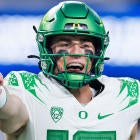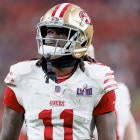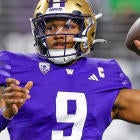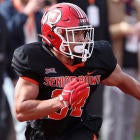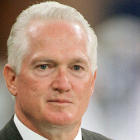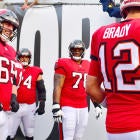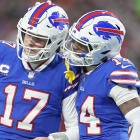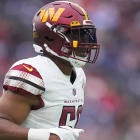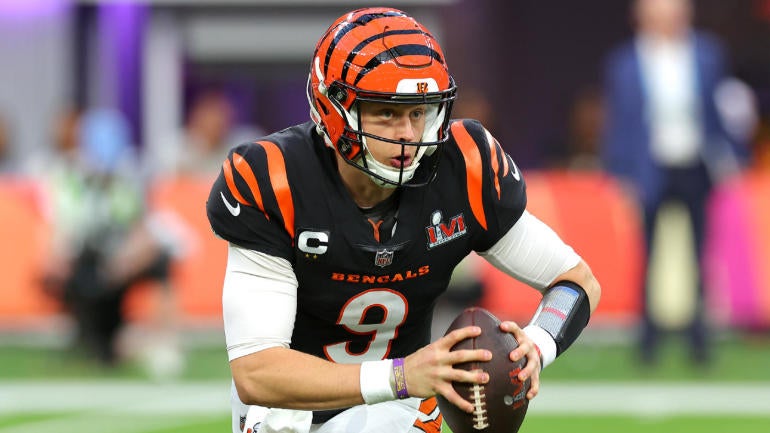
Every NFL franchise has one team that set the standard for excellence. And while some franchises have been more fortunate than others, each franchise can point to at least one team from its past that stood out from the rest. Even the Browns, a team that has never appeared in a Super Bowl, can point to a team from its semi-recent past that can serve as the example for future teams to follow.
With the start of the 2022 season just around the corner, we decided to name each franchise's best team since the start of the Super Bowl era. To create this list, we looked at the following criteria when making our selections.
- Average margin of victory during the regular season
- Offensive and defensive rankings, specifically as it relates to scoring
- Strength of the opposition
- Talent on the roster
- How far the team advanced in the postseason
Using this criteria, we were able to identify each franchise's greatest team since the start of the 1966 season. While many readers will agree with our selections, we know that some will object to at least one of our picks, which is certainly fine. Who doesn't like a good sports debate, after all?
Without further ado, let's get started.
A Super Bowl-winning team will be denoted with (*)
Arizona Cardinals: 2008
- 12-8 overall record
- Won franchise's only NFC championship
- Featured the third-ranked scoring offense during the regular season
Despite a late-season swoon that saw them lose four games in a five-game span, the Cardinals won the AFC West before going on a roll during the NFC playoffs. In three consecutive weeks, Arizona defeated Atlanta, Carolina and Philadelphia to claim the NFC championship. The Cardinals' high-scoring offense, led by quarterback Kurt Warner and receivers Anquan Boldin and Larry Fitzgerald, scored over 30 points in each of their first three playoff games.
Fitzgerald enjoyed one of the greatest postseason performances in NFL history during the '08 postseason, catching 30 passes for 546 yards and seven touchdowns. His 127-yard, two-touchdown performance nearly led the Cardinals to a Super Bowl upset over the Steelers, who won the game following Ben Roethlisberger's last-minute, game-winning drive.
Atlanta Falcons: 1998
- 16-3 overall record
- Won franchise's first NFC championship
- Boasted the league's fourth-ranked offense and defense during the regular season
The 2016 Falcons were much more competitive in their Super Bowl appearance (holding a 28-3 lead before squandering it against the Patriots), but the '98 Falcons were, statically speaking, a superior team. That season, Atlanta went 14-2 during the regular season before defeating Steve Young and the 49ers in the divisional round of the playoffs. The Falcons then defeated the 15-1 Vikings in one of the greatest upsets in NFL postseason history. Atlanta was unable to duplicate that success in Super Bowl XXXIII, however, as the Falcons were run over by the defending champion Broncos, 34-19.
The '98 Falcons, nicknamed the "Dirty Birds" during the regular season, were led by Pro Bowlers Chris Chandler, Jamal Anderson, Bob Whitfield, Jessie Tuggle, Ray Buchanan, and Eugene Robinson. Anderson, the team's lone All-Pro that season, rushed for 1,846 yards and 14 touchdowns during the regular season. The Falcons' offense also included two 1,000-yard receivers in Tony Martin and Terance Mathis.
Baltimore Ravens: 2000*
- 16-4 overall record
- Won franchise's first Super Bowl title
- Allowed 10.3 points per game, the fewest in NFL history during a 16-game season
The Ravens' 2012 championship team may have been a more balanced unit, but the utter dominance of Baltimore's 2000 defense gives them the nod as the franchise's greatest team. That season, Baltimore's defense, led by Ray Lewis and Hall of Fame safety Rod Woodson, recorded four shutouts during the regular season before allowing a total of 23 points in four postseason games. In Super Bowl XXXV, the Ravens' defense shut out the Giants' offense while holding New York to just 152 total yards.
Baltimore's 2000 squad also featured the league's best returner in Jermaine Lewis, whose 84-yard kickoff return for a score in Super Bowl XXXV ended any hope of a Giants comeback. The Ravens' offense featured a punishing running game, led by Jamal Lewis and Priest Holmes. Baltimore's offense also included Hall of Fame tight end Shannon Sharpe, whose 96-yard score spearheaded the Ravens' 16-3 win over Oakland in the AFC Championship Game.
Buffalo Bills: 1990
- 15-4 overall record
- Won franchise's first AFC title
- Finished first in the NFL in scoring and sixth in scoring defense
Buffalo's first of four AFC championship teams was its best. A team that boasted five future Hall of Fame players, the Bills won 13 games during the regular season before scoring a combined 95 points in their first two playoff games. The Bills were unable to duplicate that level of success in Super Bowl XXV, however, as the Giants' ball control offense -- along with a missed 47-yard field goal -- allowed New York to escape with a 20-19 victory.
The Bills' best players that season included quarterback Jim Kelly, running back Thurman Thomas (whose 135 rushing yards in Super Bowl XXV remains the most rushing yards by a losing player in Super Bowl history), receivers Andre Reed and James Lofton, defensive end Bruce Smith, linebackers Darryl Talley, Cornelius Bennett and Shane Conlan, and special teams ace Steve Tasker. The '90s Bills remain the only team to appear in four consecutive Super Bowls.
Carolina Panthers: 2015
- 17-2 overall record
- Featured league MVP Cam Newton
- Finished first in the NFL in scoring and sixth in scoring defense
The seventh team in NFL history to win at least 15 regular season games, the 2015 Panthers' average margin of victory was a dozen points during the 2015 season. Carolina carried its regular season momentum into the NFL playoffs, dethroning the two-time defending NFC champion Seahawks in the divisional round before routing the Cardinals in the conference championship game. The Panthers' dream season came to a crashing halt in Super Bowl 50, as Von Miller's 2.5 sacks and two forced fumbles helped the Broncos come away with a 24-10 victory.
Carolina's talented roster that season included league MVP Cam Newton, who that year became the first player in league history to throw 35 touchdowns and run for 10 touchdowns in the same season. Along with Newton, the Panthers' roster also included fellow Pro Bowlers in running back Jonathan Stewart, fullback Mike Tolbert, tight end Greg Olsen, center Ryan Kalil, right guard Trai Turner, defensive tackle Kawann Short, linebackers Luke Kuechly and Thomas Davis, and cornerback Josh Norman.
Chicago Bears: 1985*
- 18-1 overall record
- Won franchise's first Super Bowl title
- Finished second in the NFL in points scored and first in fewest points allowed
The Bears' dominant "46" defense is the first thing that usually comes to mind when reflecting back on the '85 Bears, and for good reason. That unit, led by defensive coordinator Buddy Ryan, boasted three Hall of Famers in linebacker Mike Singletary and defensive ends Richard Dent and Dan Hampton. The unit also included fellow Pro Bowlers in defensive tackle Steve McMichael, linebacker Otis Wilson and safety Dave Duerson. Together, the 46 defense recorded four shutouts before manhandling the Patriots in Super Bowl XX, 46-10.
While their defense was historically dominant, the Bears' offense that season was a special unit, too. Spearheaded by Hall of Fame running back Walter Payton, Chicago's offense -- a unit that also included quarterback Jim McMahon, Hall of Fame left tackle Jimbo Covert and perennial Pro Bowl center Jay Hilgenberg -- scored at least 20 points in all but two of their games. And while he mostly served as a decoy during Super Bowl XX, Payton was anything but that during the regular season, as he rushed for 1,551 yards and nine touchdowns while averaging 4.8 yards per carry. He also caught 49 passes for 483 yards and two scores while helping the Bears become the second team in league history to win 15 regular season games.
Cincinnati Bengals: 2021
- Won franchise's third AFC title
- Defeated top-seeded Titans and defending two-time AFC champion Chiefs in playoffs
Led by Joe Burrow, the Bengals went from a 4-11-1 outfit in 2020 to AFC champions in 2021. The NFL's Comeback Player of the Year, Burrow led the NFL in completion percentage during the regular season. He took full advantage of arguably the league's best receiving trio, led by Offensive Rookie of the Year Ja'Marr Chase. Late in the regular season, the Bengals' offense put 41 and 34 points against the Ravens and Chiefs in consecutive games en route to clinching the AFC North division crown.
Cincinnati's defense also played a crucial role in the team's AFC championship run. Led by pass rusher Trey Hendrickson, linebacker Sam Hubbard and safety Jessie Bates III, the unit came up with game-clinching plays in each of the Bengals' playoff victories. Hubbard's interception against the Titans set up Evan McPherson's game-winning field goal to propel Cincinnati to the AFC Championship Game. In overtime a week later, safety Vonn Bell's interception of Patrick Mahomes set up McPherson's second game-winning kick in as many weeks while punching the Bengals' ticket to Super Bowl LVI.
Cleveland Browns: 1987
- 11-6 overall record
- Finished third in the NFL in scoring and second in points allowed
While many Browns fans would argue that the '86 team was better, the '87 Browns had a much better margin of victory (10.1 to 5 points) as well as top-five units on both sides of the ball. A year after falling short against John Elway and the Broncos in the AFC title game, the Browns nearly left Denver with a win in the '87 AFC title game before running back Ernest Byner fumbled just short of the end zone. That's as close as the Browns have come to representing the AFC in the Super Bowl.
Cleveland's '87 team was loaded with talent. The offense included Hall of Fame tight end Ozzie Newsome along with Pro Bowlers in quarterback Bernie Kosar, fullback Kevin Mack, Byner (who enjoyed a 14-year career that included a Super Bowl win with Washington in 1991), receiver Webster Slaughter and Pro Bowl right tackle Cody Risien. Cleveland's defense featured four Pro Bowlers in nose tackle Bob Golic, linebacker Clay Matthews and defensive backs Frank Minnifield and Hanford Dixon. Cleveland's talent that season lifted it to a 38-21 playoff victory over the Colts. Kosar completed 20-of-31 passes with three touchdowns, while Byner out-rushed Colts Hall of Fame running back Eric Dickerson, 122-50.
Dallas Cowboys: 1992*
- 16-3 overall record
- Featured the Hall of Fame offensive trio of Michael Irvin, Emmitt Smith and Michael Irvin
- Finished second in the NFL in scoring and fifth in scoring defense
A strong case can be made for the '71 Cowboys, a team that featured eight Hall of Fame players. The '71 Cowboys, a team that went 10-0 with Hall of Fame quarterback Roger Staubach under center, won the franchise's first Super Bowl after routing Don Shula's Dolphins (a team that would win the next two Super Bowls) in Super Bowl VI, 24-3. But as good as that Cowboys team was, it's impossible to go against the '92 Cowboys, a team that also featured of a slew of Hall of Fame talent.
Led by their Hall of Fame offensive trio of quarterback Troy Aikman, running back Emmitt Smith and receiver Michael Irvin, Dallas averaged nearly 39 points per game during the '92 playoffs. In Super Bowl XXVII, the Cowboys scored 52 points behind a spectacular showing from Aikman, who threw four touchdowns while completing 70% of his passes. The Bills' explosive offense was held in check by a dominant Cowboys' defense that featured Hall of Fame pass rusher Charles Haley, linebacker Ken Norton Jr. and safety Darren Woodson. The '92 Cowboys' greatest moment may have taken place in the NFC title game, when they defeated Steve Young, Jerry Rice and the rest of the 49ers at Candlestick Park.
Denver Broncos: 1998*
- 17-2 overall record
- Featured Hall of Fame offensive trio of John Elway, Terrell Davis and Shannon Sharpe
- Outscored their three playoff opponents 95-34
A year after winning the franchise's first Super Bowl, the '98 Broncos won their first 13 games and finished the regular season with a 14-2 record. Denver's regular season was highlighted by Hall of Fame running back Terrell Davis, who won league MVP honors after rushing for 2,008 yards and scoring 23 touchdowns. Receivers Ed McCaffrey and Rod Smith each recorded 1,000-yard seasons, while Hall of Fame tight end Shannon Sharpe's 10 touchdown catches tied Smith for the league lead. Denver's underrated defense, led by Hall of Fame safety Steve Atwater, allowed just 13 total points in the Broncos' playoff wins over the Dolphins and Jets.
In Super Bowl XXXIII, with the Falcons' defense geared up to stop Davis, the Broncos instead showcased the talents of quarterback John Elway, who threw for 336 yards while scoring two touchdowns in his final NFL game. The Broncos, by virtue of their 34-19 win over the Falcons, became the sixth franchise to win back-to-back Super Bowls.
Detroit Lions: 1991
- 13-4 overall record
- Won the franchise's first playoff game since 1957
- Featured Hall of Fame running back Barry Sanders
Only one Lions team -- the '91 squad -- has won a postseason game since the franchise won their last championship in 1957. The engine behind the '91 team was Hall of Fame running back Barry Sanders (1,548 yards, 16 touchdowns during the regular season), whose 47-yard touchdown run capped off the Lions' 38-6 win over the Cowboys (the team that would win the next two Super Bowls) in the divisional round of the NFC playoffs. The Lions' defense -- a unit that included three Pro Bowlers in nose tackle Jerry Ball, linebacker Chris Spielman (126 tackles, three forced fumbles and three fumble recoveries) and safety Benny Blades -- forced four Cowboys turnovers while holding Dallas to 16 first downs and 276 total yards.
Along with Sanders, the Lions' offense featured perennial Pro Bowl left tackle Lomas Brown along with the receiving trio of Brett Perriman, Willie Green and Robert Clark. The Lions also had Pro Bowl returner Mel Gray, who averaged 15.4 yards per punt return.
Green Bay Packers: 1996*
- 16-3 overall record
- Featured league MVP Brett Favre
- Boasted the NFL's top-ranked scoring offense and defense during the regular season
The '66 Packers, the first Super Bowl champions, were an awesome team with a slew of Hall of Fame players. But they weren't as dominant as the '96 Packers, a team that won 14 games by at least 10 points. In fact, in their final eight games of the '96 season (all wins), the Packers' margin of victory was a whopping 21.1 points. In the playoffs, Green Bay outscored the opposition 100-48. The Packers capped off their dominant season by defeating the Patriots in Super Bowl XXXI, 35-21. The star of the game was return specialist Desmond Howard, whose 99-yard kickoff return for a touchdown helped clinch Green Bay's first championship in 29 years.
Along with league MVP Brett Favre, the Packers' '96 roster included Hall of Fame pass rusher Reggie White, who recorded three sacks during the second half of Super Bowl XXXI. Green Bay's roster also included Pro Bowl safety LeRoy Butler, defensive tackle Gilbert Brown, Pro Bowl center Frank Winters, running backs Dorsey Levens and Edgar Bennett, and receivers Antonio Freeman, Robert Brooks and Andre Rison. In Super Bowl XXXI, Rison's 54-yard touchdown catch gave the Packers an early lead, while Freeman's 81-yard touchdown catch (at the time, the longest touchdown reception in Super Bowl history) gave Green Bay the lead for good.
Houston Texans: 2012
- 13-5 overall record
- Finished top-10 in the NFL in scoring and scoring defense
- Featured Defensive Player of the Year J.J. Watt
A year after winning the franchise's first playoff game, the 2012 Texans won a franchise record 12 regular season games before defeating the Bengals in the wild card round. Houston was led by J.J. Watt, who won Defensive Player of the Year that season after recording a league high 20.5 sacks. The Texans' roster featured seven other Pro Bowlers in receiver Andre Johnson (112 catches, 1,598 yards), running back Arian Foster (1,424 rushing yards, 15 touchdowns), quarterback Matt Schaub, tight end Owen Daniels, cornerback Johnathan Joseph, center Chris Myers, left guard Wade Smith, and left tackle Duane Brown. Johnson, a seven-time Pro Bowl, will be eligible for the Hall of Fame in 2022.
Indianapolis Colts: 2006*
- 16-4 overall record
- Won franchise's first Super Bowl since moving from Baltimore to Indianapolis
- Featured Hall of Fame talents of QB Peyton Manning and WR Marvin Harrison
After six disappointing playoff exits, Peyton Manning's Colts finally got over the hump in 2006, defeating the Bears 29-17 in Super Bowl XLI. It wasn't easy, however, as Indianapolis had to win four playoff games that included its dramatic, come-from-behind win over the Patriots in the AFC Championship Game. The Colts also needed five Adam Vinatieri field goals to beat the top-seeded Ravens in the divisional round.
Along with Manning, the '06 Colts featured Hall of Fame receiver Marvin Harrison (1,366 yards, 12 touchdowns), Pro Bowl receiver Reggie Wayne (1,310 yards, nine touchdowns), running back Joseph Addai (1,406 all-purpose yards, eight touchdowns), tight end Dallas Clark, defensive end Dwight Freeney, linebackers Cato June and Gary Brackett, and safety Bob Sanders, who the following year would be tabbed as the NFL's Defensive Player of the Year. The '06 Colts were led by coach Tony Dungy, who was inducted into the Hall of Fame in 2016.
Jacksonville Jaguars: 1999
- 15-3 overall record
- Featured the NFL's top-ranked scoring defense and sixth-ranked scoring offense
- Lost to only one team (three times): the Tennessee Titans
The '99 Jaguars had some competition as the franchise's best team. The '96 squad, after a 4-7 start, won seven straight games that included a stunning playoff victory over the Broncos. The '17 Jaguars, a team that featured the second-ranked scoring defense and fifth-ranked scoring offense, upset the favored Steelers in the playoffs before falling just short against the Patriots in the AFC title game.
But the '99 Jaguars got the nod based on their franchise-record 14-win regular season. In fact, the only team Jacksonville lost to in 1999 was the Titans, who defeated them twice during the regular season before defeating Jacksonville again in the AFC title game. The Jaguars' playoff loss came after they throttled in the Dolphins -- 62-7 -- in what would be the final game of Dan Marino's Hall of Fame career.
The '99 Jaguars featured quarterback Mark Brunell, running back Fred Taylor and receiver Jimmy Smith (1,636 reaching yards), who are the franchise's all-time career passing, rushing and receiving leaders. Along with Brunell and Smith' the '99 Jaguars included five other Pro Bowlers in offensive tackles Tony Boselli and Leon Searcy, defensive end Tony Brackens (12 sacks, two interceptions, two forced fumbles), linebacker Kevin Hardy (10.5 sacks) and free safety Carnell Lake.
Kansas City Chiefs: 2019*
- 15-4 overall record
- Won franchise's first Super Bowl since AFL-NFL merger
- First team in NFL history to overcome three double-digit deficits in the playoffs
After a 7-4 start, the Chiefs won their final nine games that included a 31-20 win over the 49ers in Super Bowl LIV. Patrick Mahomes, the league's MVP the previous season, became the first player in league history to win a league and Super Bowl MVP before his 25th birthday. And while Mahomes was a major reason for their first championship in 50 years, the Chiefs were hardly a one-man show. Along with Mahomes, the Chiefs' 2019 roster featured five other Pro Bowlers in receiver Tyreek Hill, tight end Travis Kelce (97 catches, 1,229 yards), defensive linemen Chris Jones and Frank Clark, and safety Tyrann Mathieu.
While the '19 Chiefs won the title as the franchise's best team, a tip of the cap goes out to the '69 Chiefs, the second and final AFL team to win the Super Bowl. The '69 Chiefs featured eight Hall of Famers in coach Hank Stram, quarterback Len Dawson, defensive tackles Curly Culp and Buck Buchanan, linebackers Bobby Bell and Willie Lanier and safety Johnny Robinson.
San Diego/Los Angeles Chargers: 2007
- Overall record: 13-6
- Featured the fifth-ranked scoring offense and fifth-ranked scoring defense
- Upset the defending champion Colts in the divisional round of the playoffs
With respect to the '94 Chargers -- the only Chargers team to actually make it to the Super Bowl -- the '07 team was more talented and faced stiffer competition. The '07 team, led by Hall of Fame running back LaDainian Tomlinson (1,949 all-purpose yards, 18 touchdowns) and two future Hall of Famers in quarterback Philip Rivers and tight end Antonio Gates, captured the AFC West division title before defeating the Titans in the opening round of the playoffs. In the divisional round, the Chargers upset Peyton Manning and the rest of the defending champion Colts, 28-24.
Despite playing most of the game without Tomlinson, and with Rivers playing through a torn ACL injury, the Chargers gave the then-undefeated Patriots everything they could handle in the AFC title game. In fact, had the Chargers had a healthy Tomlinson in the backfield, it's very likely that the Chargers, not the Giants, would have been the team that ended the Patriots' dreams of an undefeated season.
St. Louis/Los Angeles Rams: 1999*
- Overall record: 16-3
- Won franchise's first Super Bowl title
- Featured the league's top-scoring offense and fourth-ranked scoring defense
Spearheaded by their "Greatest Show on Turf" offense, the Rams scored 526 points during the '99 regular season. Kurt Warner won league and Super Bowl MVP honors, while Marshall Faulk became the second player ever to eclipse 1,000 yards rushing and receiving. Isaac Bruce, a member of the 2020 Hall of Fame induction class, led the Rams in touchdown receptions. His 73-yard touchdown catch gave St. Louis the lead late in Super Bowl XXXIV.
The '99 Rams' defense, a vastly underrated unit, included All-Pro defensive end Kevin Carter (17 sacks), Pro Bowler cornerback Todd Lyght (six interceptions), right tackle D'Marco Farr (8.5 sacks, four forced fumbles) and linebackers London Fletcher and Mike Jones. Jones' last-second tackle on Kevin Dyson secured the Rams' first Super Bowl win.
Miami Dolphins: 1972*
- Overall record: 17-0
- The only NFL team to go undefeated for an entire season
- Featured the league's top-ranked scoring offense and defense
How dominant were the '72 Dolphins? Miami scored more than double the number of points (385) as its defense allowed (171) during the regular season. While their "No Name" defense has rightfully gone down as arguably the greatest unit in league history, the Dolphins' offense was pretty great, too. Miami's offense featured running backs Larry Csonka and Mercury Morris, the first pair of teammates to each run for over 1,000 yards in the same season. Along with Csonka and quarterback Bob Griese, the Dolphins' offense featured two other Hall of Famers in receiver Paul Warfield and right guard Larry Little.
Super Bowl VII served as showcase for Miami's dominant defense, led by game MVP Jack Scott, whose two interceptions helped the Dolphins defeat Washington, 14-7. Manny Fernandez recorded 17 tackles, while Hall of Fame linebacker Nick Buoniconti also came up with a key interception.
Minnesota Vikings: 1998
- Overall record: 16-2
- Featured the highest-scoring offense (at the time) in NFL history
- Posted a 16.3 average margin of victory
With respect to Bud Grant's four Super Bowl teams, the '98 Vikings are the most dominant team in franchise history. They are also arguably the greatest NFL team that didn't reach the Super Bowl. Led by Hall of Fame receivers Randy Moss (that year's Offensive Rookie of the Year) and Cris Carter, All-Pro quarterback Randall Cunningham, Hall of Fame defensive end John Randle, and an offensive line that featured three Pro Bowlers, the Vikings lost one game (27-24 to the Buccaneers in Week 9) during the regular season. Minnesota, which scored a then-NFL record 556 points during the regular season, ran away from the Cardinals in the divisional round before hosting the Falcons in the NFC title game.
Despite jumping out to a 20-7 lead, the Vikings never fully distanced themselves from the Falcons, who pulled to within a touchdown of Minnesota late in the fourth quarter. And after a missed field goal by Gary Anderson (who made each of his first 39 attempts that season), the Falcons tied the score with less than a minute left. Atlanta, after forcing two Vikings punts, won the game in overtime. The Falcons were ultimately dismantled in Super Bowl XXXIII, while the Vikings continue to search for their next trip to the big game.
New England Patriots: 2016*
- Overall record: 17-2
- Featured the top-ranked scoring defense and third-best scoring offense
- Overcame a 28-3 deficit to win Super Bowl LI
It came down to the Patriots' '04 and '16 squads as their best team. But the nod ultimately went to the group that overcame the largest deficit -- 28-3 -- in Super Bowl history. But the '16 Patriots should be remembered for more than just their epic comeback. This New England team finished third in the league in scoring and first in scoring defense. They went 3-1 without Tom Brady under center at the start of the season. And when Brady came back, New England lost just one more game while winning 11 games by double figures. They defeated the Texans and Steelers by a combined score of 70-33 before scoring 31 unanswered points against Atlanta in the Super Bowl.
Along with Brady, the Patriots' offense featured a 1,000-yard running back (LeGarrette Blount), a 1,000-yard receiver (Julian Edelman) and a lethal tight end combination in Martellus Bennett and Rob Gronkowski, who combined to catch 80 passes for 1,241 yards and 10 touchdowns. On defense, the Patriots were led by Pro Bowlers Dont'a Hightower and Devin McCourty along with linebackers Jamie Collins and Rob Ninkovich and cornerback Malcolm Butler.
New Orleans Saints: 2009*
- 16-3 overall record
- Won franchise's first Super Bowl title
- Outscored opponents 107-59 in the postseason
Led by future Hall of Fame quarterback Drew Brees, the Saints roared out to a 13-0 start before coasting to the NFC South division title. In the playoffs, the Saints routed the defending NFC champion Cardinals before outlasting Brett Favre, Adrian Peterson and the rest of the Vikings in the NFC title game. In Super Bowl XLIV, the Saints overcame a 10-0 deficit to defeat Peyton Manning and the Colts, 31-17. Brees earned MVP honors after going 32-of-39 for 288 yards with two touchdowns and zero interceptions. Pierre Thomas and Reggie Bush combined to amass 148 yards and a touchdown on 24 total touches against the Colts, while Marques Colston led the Saints in receiving.
While the Saints' offense featured four Pro Bowlers in Brees, center Johnathan Goodwin, right guard Jahri Evans and right tackle Jon Stinchcomb, their offense boasted three more Pro Bowlers in middle linebacker Jonathan Vilma and safeties Roman Harper and Darren Sharper.
New York Giants: 1986*
- 17-2 overall record
- Won franchise's first Super Bowl
- Outscored opponents 105-23 in the postseason
After dropping their season-opener in Dallas, the Giants would lose just one more game during the rest of the '86 season. In the playoffs, the Giants walloped Joe Montana and the 49ers, 49-3, before shutting out Washington in the NFC Championship Game. In Super Bowl XXI, New York trailed 10-9 at intermission before outscoring the Broncos 30-10 in the second half en route to a 39-20 victory. Game MVP Phil Simms enjoyed an historic outing, completing a record 88% of his pass attempts for 268 yards and three touchdowns. He completed all 10 of his attempts in the second half while throwing touchdown passes to Mark Bavaro and Phil McConkey.
The Giants' dominant defense, a unit that included four Pro Bowlers in defensive ends Jim Burt, Leonard Marshall, Harry Carson and Lawrence Taylor (that year's Defensive Player of the Year) intercepted John Elway three times. New York's defense also came up with a pivotal goal-line stand during the first half that included Taylor's crucial tackle of Elway just short of the goal line. The Broncos also had no answers as it related to stopping Giants linebacker Carl Banks, who recorded 10 tackles that included four behind the line of scrimmage.
New York Jets: 1968*
- 13-3 overall record
- Defeated the defending AFL champion Raiders in league title game
- Upset the NFL champion Colts in Super Bowl III
After a 7-3 start, Weeb Ewbank's Jets would win their final six games that included impressive postseason victories over the Raiders and Colts. A 17.5 point underdog entering Super Bowl III, the Jets' defense forced five turnovers that included three interceptions of Colts quarterback Earl Morrall, the NFL's MVP that season. The Jets' defense, a unit that included four Pro Bowlers in defensive ends Gary Philbin and Verlon Biggs, tackle John Elliott and linebacker Al Atkinson, also recorded an interception off of Hall of Fame quarterback Johnny Unitas, who relieved Morrall in the third quarter. Randy Beverly recorded two of the Jets' four interceptions, while Johnny Sample, who led the Jets with seven picks during the regular season, also came up with an interception.
Joe Namath, who boldly guaranteed victory during the week of the game, completed 17 passes against the Colts' formidable defense. Namath had a field day throwing to George Sauer, who caught eight passes for 133 yards. Namath, who didn't throw a single pass in the fourth quarter, relied heavily on his running game, led by Matt Snell, who gashed the Colts to the tune of 121 yards and a score on 30 carries. New York's 16-7 win, the AFL's first victory over the NFL, is considered the greatest upset in pro football history.
Oakland/Los Angeles Raiders: 1976*
- 16-1 overall record
- Dethroned the defending two-time champion Steelers in AFC title game
- Won franchise's first Super Bowl
After losing in three of the previous four AFC title games, John Madden's Raiders finally broke through in 1976, defeating the rival Steelers in the AFC Championship Game before routing the Vikings in Super Bowl XI, 32-14. Oakland's offense was loaded with star power. It featured five future Hall of Fame players in quarterback Ken Stabler, receiver Fred Biletnikoff, tight end Dave Caster and offensive linemen Art Shell and Gene Upshaw. Cliff Branch, the team's leading receiver that season, is arguably the best player in NFL history who has yet to receive his gold jacket.
The Raiders' intimidating defense featured a pair of future Hall of Famers in linebacker Ted Hendricks and cornerback Willie Brown, whose 75-yard pick-six put the exclamation point on the Raiders' Super Bowl win. Oakland's defense also featured Pro Bowl linebacker Phil Villapiano, cornerback Skip "Dr. Death" Thomas, and safeties George Atkinson and Jack "The Assassin" Tatum.
Philadelphia Eagles: 2017*
- 16-3 overall record
- Had 10.2-point average margin of victory
- Won the Super Bowl with a backup quarterback
The Eagles already had arguably the NFL's best roster before they traded a 2018 mid-round pick to acquire Pro Bowl running back Jay Ajayi midway through the '17 season. Ajayi was the perfect complement for fellow running backs LeGarrette Blount and Corey Clement, as the Eagles boasted the league's third-best rushing attack during the regular season. Philadelphia's strong running game enabled it to overcome the loss of MVP candidate Carson Wentz, who suffered a season-ending injury 13 weeks into the season.
Wentz's replacement, Nick Foles, would enjoy a Cinderella story that included an MVP performance in Super Bowl LII. In the highest scoring Super Bowl ever, Foles threw for 373 yards and three touchdowns while leading the Eagles to a 41-33 win over the Patriots. Foles received stellar protection from center Jason Kelce, right guard Brandon Brooks and right tackle Lane Johnson, who each received Pro Bowl recognition. Philadelphia's defense, a unit that finished fourth in points allowed during the regular season, featured defensive tackle Fletcher Cox, defensive end Brandon Graham, and free safety Malcolm Jenkins.
Pittsburgh Steelers: 1978*
- 17-2 overall record
- Featured league MVP Terry Bradshaw as well as the NFL's top-ranked defense
- Defeated the previous two AFC Super Bowl participants during the playoffs
There's a long-running debate in Pittsburgh between the '75 and '78 Steelers. While the '75 Steelers enjoyed a larger average margin of victory (15 points to 10.1 points), the '78 Steelers had a much more polished Bradshaw, who won league and Super Bowl MVP honors. Bradshaw was flanked on the offensive side of the ball by fellow Hall of Famers in center Mike Webster, running back Franco Harris and receivers Lynn Swann and John Stallworth. Harris' 22-yard touchdown run gave the Steelers a double-digit lead over the Cowboys late in Super Bowl XIII, while Swann's 18-yard scoring catch moments later gave Pittsburgh an insurmountable lead. Stallworth's two first-half touchdowns helped propel Pittsburgh to a 21-14 halftime lead. Bradshaw's 318 yards and four touchdown passes were both Super Bowl records.
While Pittsburgh's offense had blossomed into a machine by '78, its defense was just as dominant as it had been earlier in the decade. Leading the NFL's top-ranked defense in '78 was two-time NFL Defensive Player of the Joe Greene along with fellow Hall of Famers Jack Ham, Jack Lambert, Mel Blount and Donnie Shell. L.C. Greenwood, one of the best Steelers not currently in Canton, earned his fifth of six Pro Bowl selections that season.
San Francisco 49ers: 1989*
- Overall record: 17-2
- Outscored their playoff opponents 126-26
- Owners of the largest margin of victory in Super Bowl history
This was the hardest decision on the list. San Francisco has two all-time great teams in the '89 and '84 squads. The '84 49ers, the second of Bill Walsh's three Super Bowl championship teams, were the first team in league history to win 15 regular season games. In the playoffs, they defeated the next two Super Bowl champions (the Giants and Bears) before humbling Dan Marino and the Dolphins' prolific offense in Super Bowl XIX.
As great as the '84 49ers were, they were edged out by the '89 team, a team that had Jerry Rice, who was drafted several months after San Francisco's Super Bowl win over Miami. Rice was at the peak of his powers in 1989, catching three touchdown passes in the 49ers' 55-10 win over the Broncos in Super Bowl XXIV. Rice was half of arguably the greatest quarterback receiving duo in NFL history. The other half, quarterback Joe Montana, won his first of two league MVP honors that season. He also won his third Super Bowl MVP award after torching the Broncos for a then Super Bowl record five touchdown passes.
While the 49ers' offense -- a unit that also included running back Roger Craig, receiver John Taylor and Pro Bowl left guard Guy McIntyre -- was elite, San Francisco's defense was also a dominant unit. Led by Hall of Famers Ronnie Lott and Charles Haley, the 49ers' defense held 12 opponents to 16 points or less.
Seattle Seahawks: 2013*
- Overall record: 16-3
- Featured the NFL's top-ranked scoring defense
- Manhandled the league's most prolific offense in Super Bowl XLVII
Matched up against one of the most statistically dominant offenses in NFL history, the Seahawks' "Legion of Boom" defense held Peyton Manning and the Broncos to just eight points. The Seahawks' offense put together five scoring drives while helping Seattle capture its first-ever Super Bowl title.
The Seahawks' defense, a unit that allowed an average of 14.4 points per game during the regular season, was anchored by cornerback Richard Sherman, safeties Earl Thomas and Kam Chancellor, linebacker Bobby Wagner and defensive ends Cliff Avril and Michael Bennett. Seattle's offense featured three Pro Bowlers in quarterback Russell Wilson, Marshawn Lynch (1,257 yards, 12 touchdowns) and center Max Unger.
Tampa Bay Buccaneers: 2020*
- 15-5 overall record
- Featured the NFL's third-ranked offense and eighth-ranked defense
- Defeated quarterbacks Drew Brees, Aaron Rodgers and Patrick Mahomes
The 2002 Buccaneers will always hold a special place in the hearts of Tampa Bay fans as the franchise's first title team. But the 2020 Buccaneers were a more balanced team who put together one of the most dominant performances in Super Bowl history. The '20 Buccaneers also had the "GOAT," quarterback Tom Brady, who won a record seventh Super Bowl and fifth Super Bowl MVP.
After a slow start, Tampa Bay won its final eight games. In the playoffs, they sent Drew Brees into retirement before defeating league MVP Aaron Rodgers in his own backyard. In Super Bowl LV, the Buccaneers' often overlooked defense -- led by linebackers Devin White, Shaquil Barrett and Lavonte David, defensive linemen Ndamukong Suh and Jason Pierre-Paul, and defensive backs Antoine Winfield Jr., Jordan Whitehead and Carlton Davis -- held Patrick Mahomes and the rest of the Chiefs' mighty offense to just nine points. Brady did his part, tossing three touchdown passes -- two to tight end Rob Gronkowski -- before halftime. Leonard Fournette, proving that a successful running game still matters in the NFL, essentially put the game on ice with his 27-yard touchdown run midway through the third quarter.
Tennessee Titans: 1999
- Overall record: 16-4
- Won franchise's first AFC title
- Won all three games against the Jaguars, who were 15-0 against the rest of the NFL
After three consecutive 8-8 seasons, Tennessee finally broke through in 1999, its first season as the Titans. Tennessee received a major shot in the arm from pass rusher Javon Kearse, whose 14.5 sacks helped him win Defensive Rookie of the Year. But despite the Titans' 13-3 regular season, they entered the playoffs as a wild card team, and needed a "Music City Miracle" to defeat the Bills in the wild card round. The Titans took off from there, though, upsetting the second-seeded Colts in the divisional round before defeating the top-seeded Jaguars for a third time in the AFC title game.
Trailing 16-0 in Super Bowl XXXIV, the Titans, led by the combined brilliance of Steve McNair and Eddie George, battled back to tie the score with 2:12 left. But after the Rams quickly regained the lead, McNair's final pass of the game, a slant to Kevin Dyson, saw Dyson get tackled a yard shy of the end zone. While they didn't become the franchise's first world champion, the '99 Titans remain its best team to date.
Washington Commanders: 1991*
Overall record: 14-2
- Scored twice as many points (485) than they allowed (224)
- Featured the NFL's top-ranked scoring offense and second-ranked scoring defense
- Outscored their playoff opponents 102-41
Washington's '91 squad is one of the most underrated teams of the Super Bowl era. Joe Gibbs' third Super Bowl title team breezed through the regular season, losing just two games by a combined five points. In the playoffs, Washington ran through the Falcons (24-7) and Lions (41-10) before coasting to a 37-24 win over the Bills in Super Bowl XXVI. Quarterback Mark Rypien (291 yards, two touchdowns) took home the game's MVP award. He had extreme success throwing the ball to receivers Gary Clark and Art Monk, who combined to catch 14 passes for 227 yards and a touchdown against the Bills' formidable defense. Rypien received sturdy protection from a talented offensive line that included left tackle Jim Lachey, center Jeff Bostic, right guard Mark Schlareth and right tackle Joe Jacoby.
Speaking of defense, Washington's unit, led by defensive ends Charles Mann and Fred Stokes along with defensive back Darrell Green and Brad Edwards, forced five Buffalo turnovers that included four picks of Bills quarterback Jim Kelly. Washington's defense also held Thurman Thomas, the league's MVP that season, to just 13 yards on 10 carries.














